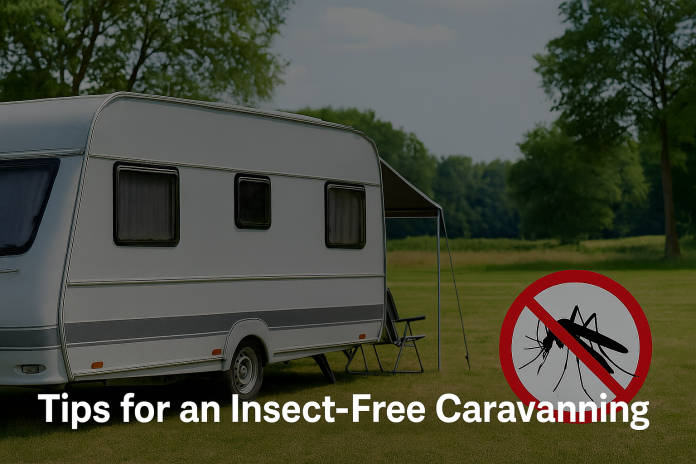There’s nothing like hitting the road for a caravanning holiday, fresh air, scenic views, and the freedom to explore. But nothing ruins the experience faster than a swarm of mozzies or ants crawling into your caravan. Insects are more than just a nuisance; they can cause sleepless nights, itchy bites, and even pose health risks if not handled properly.
The good news? With a bit of planning, you can keep bugs at bay and focus on enjoying the great outdoors. Whether you’re camping in the bush or by the beach, the following practical tips will help you stay protected and comfortable, especially if you’re travelling in small camping trailers for sale, where space and airflow can be limited.
Let’s take a look at six helpful tips to help make your caravanning holiday insect-free and stress-free.
1. Choose Your Campsite Wisely
Where you park your caravan can make a big difference when it comes to insect activity. Stagnant water, thick vegetation, and damp ground are all ideal breeding grounds for mosquitoes and other insects. Setting up camp near these areas can quickly lead to an uncomfortable stay.
Instead, look for elevated, open, and breezy locations. Insects, especially mosquitoes, tend to avoid windy areas, making them a safer and more pleasant choice for your setup. Before finalising a site, it’s also worth checking online reviews — previous campers often mention if the area is prone to insect issues. A few minutes of research can save you hours of swatting and scratching later.
2. Keep Doors and Windows Sealed
Keeping insects out starts with sealing off their entry points. Make sure all caravan doors and windows have properly fitted flyscreens and repair any tears or gaps before you hit the road. Even the smallest opening can invite mozzies, flies, or ants inside.
Magnetic mesh screens are also a great option, especially for easy access in and out of the van without leaving it wide open. They’re simple to install and provide an extra layer of protection.
Be extra mindful during dusk and dawn when insects are most active. Always close doors quickly to prevent bugs from sneaking in. A few seconds of care can save you from hours of chasing them around later.
3. Use Natural and Safe Insect Repellents
When spending time outdoors, especially in the evenings, having a reliable insect repellent on hand is essential. Go for skin-safe options made with natural ingredients like citronella, tea tree, or eucalyptus oil. These are gentle on the skin but effective in keeping bugs at bay.
For extra protection, light citronella candles or mosquito coils around your outdoor seating area. They help create a barrier that repels insects while you relax or eat outside.
You can also spray insect-repellent products on your awnings, tables, chairs, and even doormats. This adds another layer of defence, making your space less attractive to unwanted visitors.
4. Maintain a Clean Campsite
A tidy campsite is one of the simplest and most effective ways to keep insects away. Ants, flies, and even wasps are drawn to leftover food and rubbish, so proper cleanliness goes a long way.
Always store your food in sealed containers and keep snacks out of reach when not in use. Dispose of rubbish daily using bins with secure, tight-fitting lids. If none are provided, use your own sealed garbage bags until you can dispose of them properly.
Wipe down tables, benches, and cooking areas after each use, and clean up any spills right away. Even a few crumbs can invite a trail of ants into your van. This is especially important if you’re staying in a camping trailer for sale in Sydney, where space is limited and every surface matters.
5. Use Insect-Proof Lighting
The type of lighting you use can make a big difference in attracting — or repelling — insects. White or bright lights are like a beacon for bugs, drawing them straight to your campsite the moment the sun goes down.
To avoid this, switch to yellow LED lights or specially designed bug-repellent bulbs. These produce a warm glow that’s less appealing to insects, helping you enjoy your evenings without constant buzzing.
Also, try to minimise the use of lighting when it’s not necessary. Dimmed or directed light sources reduce visibility to insects and make your setup less conspicuous.
6. Prepare for Insect Emergencies
Even with all the proper precautions, it’s wise to be prepared in case insects still find their way in. Bites and stings can happen unexpectedly, so having the right supplies on hand can make a big difference.
Pack antihistamines, bite creams, and soothing gels as part of your first-aid essentials. These help reduce swelling, itching, and discomfort from common insect bites. It’s also a good idea to create a small insect-specific kit in your caravan, including tweezers, antiseptic wipes, and cold packs.
Familiarise yourself with how to identify and treat bites from common Australian bugs, such as mosquitoes, ants, and wasps. Knowing when to seek medical attention can give you peace of mind and keep your holiday on track.
Conclusion
Insects can quickly turn a relaxing caravanning trip into a hassle. With a few simple habits, such as choosing the right spot, sealing up your van, and keeping things clean, you can keep bugs at bay. These tips work whether you’re in a large caravan or a small camping trailer for sale. A little planning goes a long way. Enjoy a bite-free, stress-free holiday!


